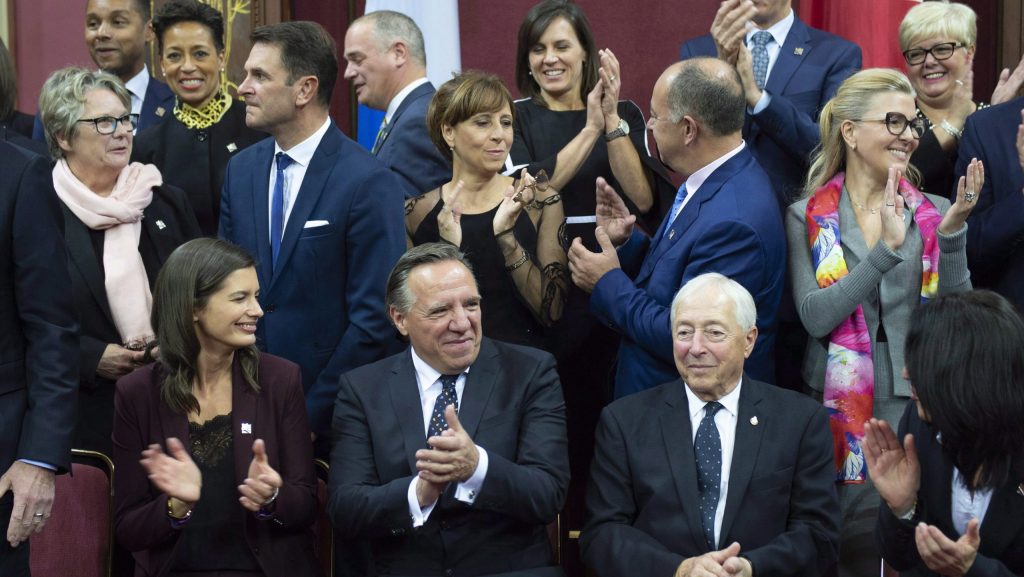Presence of women in Quebec politics difficult to sustain, new book suggests

Posted September 23, 2024 2:43 pm.
With women now occupying more than 45 per cent of the seats in the National Assembly, some might be tempted to think the fight for equality is over.
But a new book warns that nothing can be taken for granted, and that the presence of women in politics remains difficult to sustain.
“They’re not that good, the bimbos in the Cabinet.” That’s what a minister in the François Legault government is said to have uttered, according to MNA Chantal Soucy, who spoke to former Canadian Press parliamentary correspondent Jocelyne Richer.
Richer has spent more than 20 years observing Quebec’s political landscape and is particularly interested in the situation of elected women. For her book “The Sex of Power,” which will be published Tuesday, the journalist interviewed numerous female politicians, past and present, and finds that elected women face the same obstacles they did 40 years ago.
They have to adapt to an environment designed by men for men.
“They say, ‘We’re opening the doors, come in large numbers,’ but once a woman sets foot in Parliament, they say, ‘Adapt yourself’,” Richer recounted in an interview with The Canadian Press.
“Adapt to the system as it is. Even if there’s no maternity leave, work it out. If you have young children, we want you to be present and then make it so that your situation doesn’t interfere.”
She also gives the example of women’s clothing, which constantly remains a topic of discussion, and which led former Premier Pauline Marois, for example, to adopt more sober clothes, a “masculine dress code,” describes the author.
And Richer notes that the arrival of more women in power has not solved the problem.
“There’s still this vague feeling of exclusion, this feeling that they’re sitting on an ejector seat,” she explained. “They feel that their credibility is constantly called into question, that a double standard is applied to them.”
To illustrate her point, Richer draws a parallel between two women who lived through very different eras: Marois and the current deputy premier of the Legault government, Geneviève Guilbault.
Both women, “talented, ambitious and ready to give their all,” chose not to sacrifice their personal lives and to have children while in office. Guilbault, who was elected in a 2017 byelection, was pregnant with her first child at the time and during the campaign, and she accused her opponents of using the issue against her.
She gave birth on Dec. 27 of that year. She went back to work in mid-January, and on Jan. 22, 2018, she joined Coalition Avenir Québec Leader Legault at a party caucus in Sainte-Adèle.
Marois had also given birth when she was a minister, and after a few days, she was back at work – even though she was breast-feeding, she recounts in her biography “Beyond Power.”
“Forty years later, nothing has changed,” said Richer.
The author also examines the case of three women in the first Legault government – MarieChantal Chassé, Marie-Ève Proulx and Sylvie D’Amours – who were excluded and replaced by men.
RELATED: Far more women than men not seeking re-election in Quebec’s fall vote
Chassé, then minister of the environment, was replaced less than three months later after some difficult moments in the media.
She was succeeded by Minister Benoit Charette, breaking the balance in Legault’s cabinet, which had only been equal from October 2018 to January 2019.
“No one is immune from a blunder, a possible breach of ethics, an error in judgment, a difficulty in communicating clearly with the media. But if the fault is attributed to a man, it’s quickly forgiven, whereas it could mean a dismissal for a woman,” maintains Richer.
The author herself, who was well aware of this phenomenon as a journalist, says she was surprised to see the extent to which women – from all political parties and of all ages – made similar comments.
“I thought: There’s going to be a generation clash in the way they read their prerogatives as women. Not at all.
“I found it incredible to hear a 30-year-old woman or an 80-year-old woman, an ex-parliamentarian, saying pretty much the same thing about double standards, mansplaining and the dictatorship of the image.”
The author does not venture to offer solutions, asserting that this is the responsibility of elected representatives.
She believes, however, that it was important to give women a platform to “name the uneasiness and document it,” “that they say what they don’t like, what it is about the current political culture that bothers them and acts as a brake on their political careers,” she said in an interview.
–This report by La Presse Canadienne was translated by CityNews








